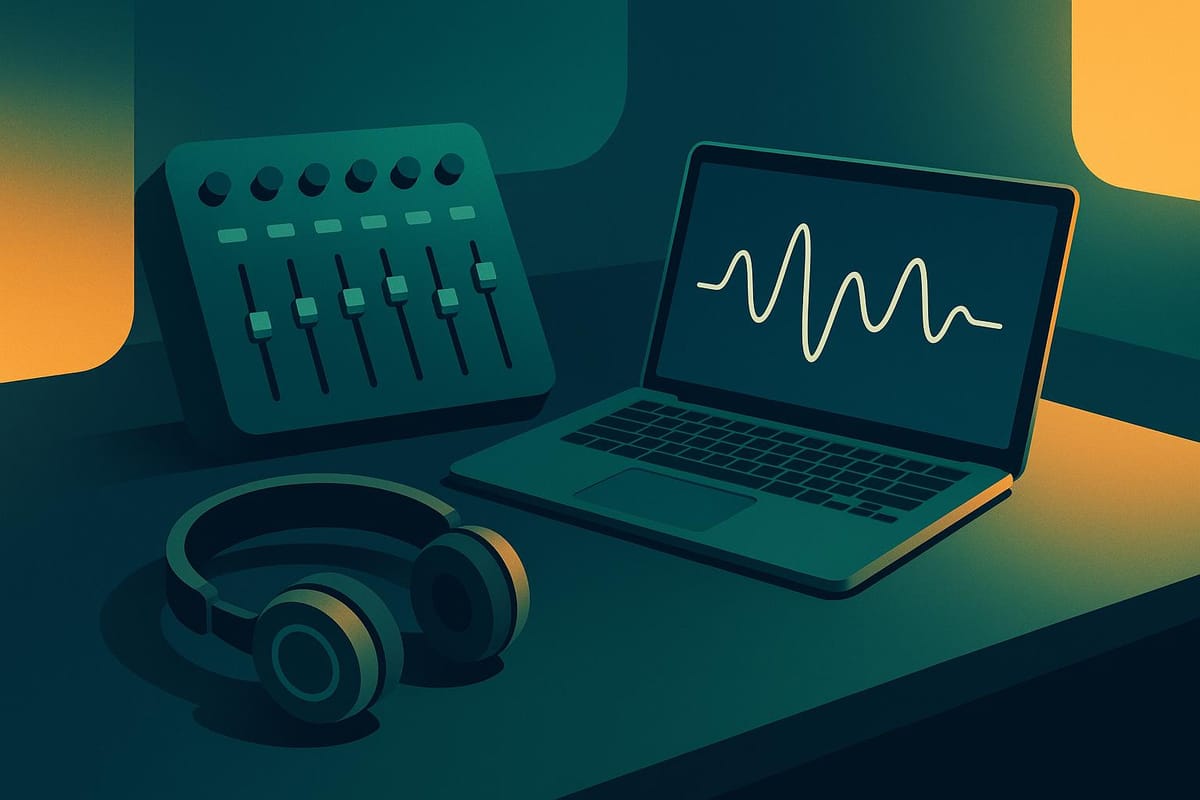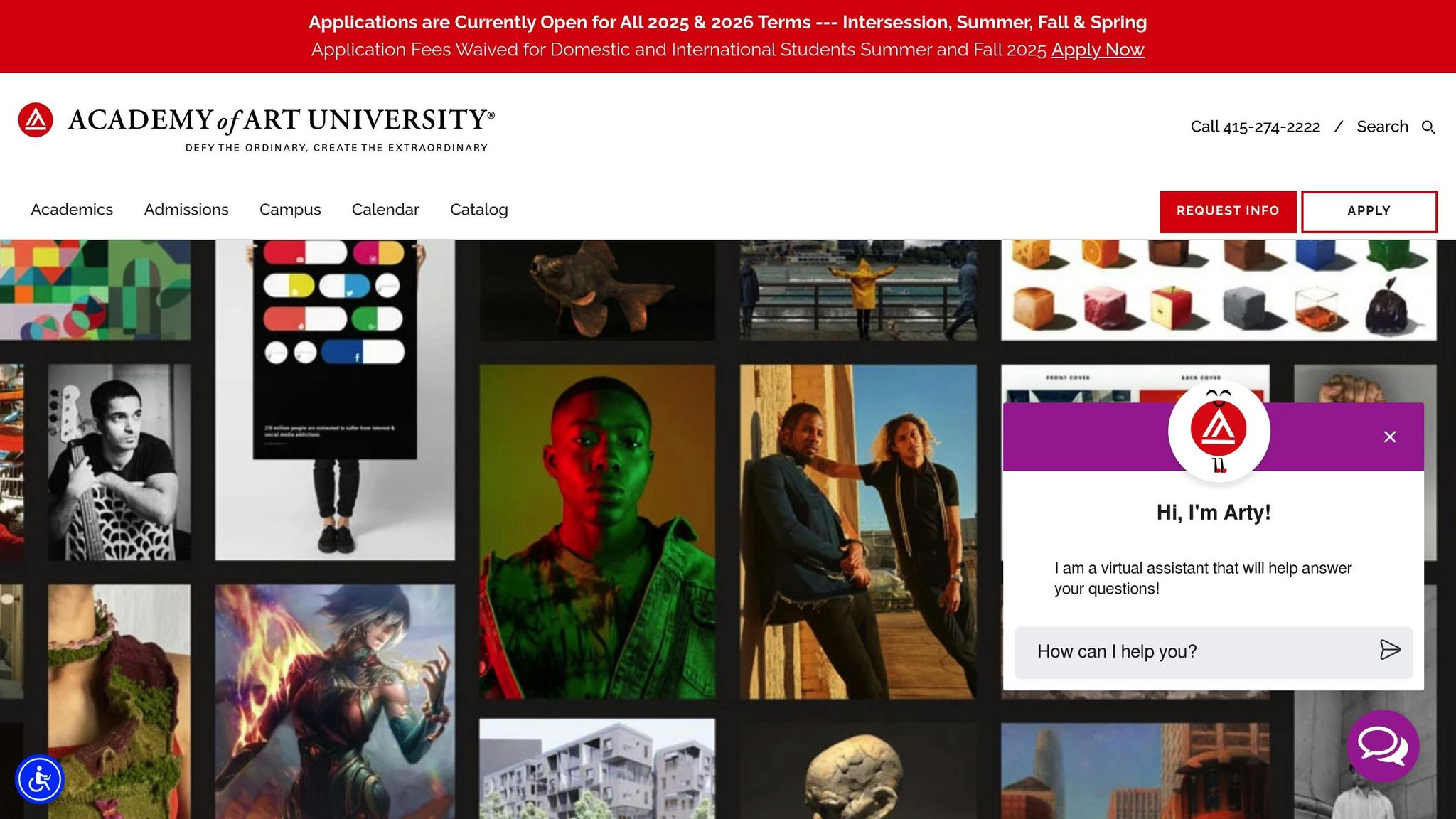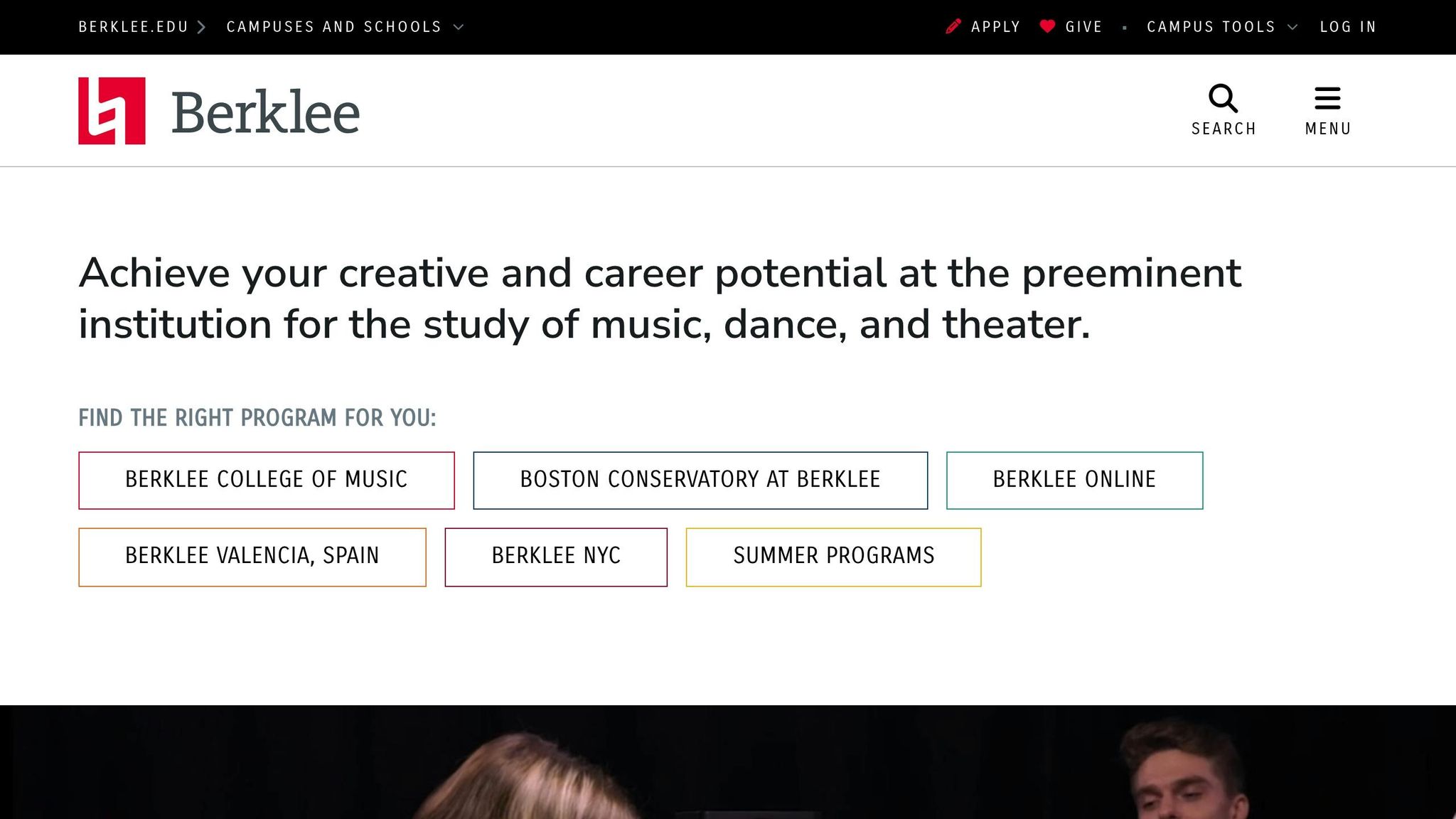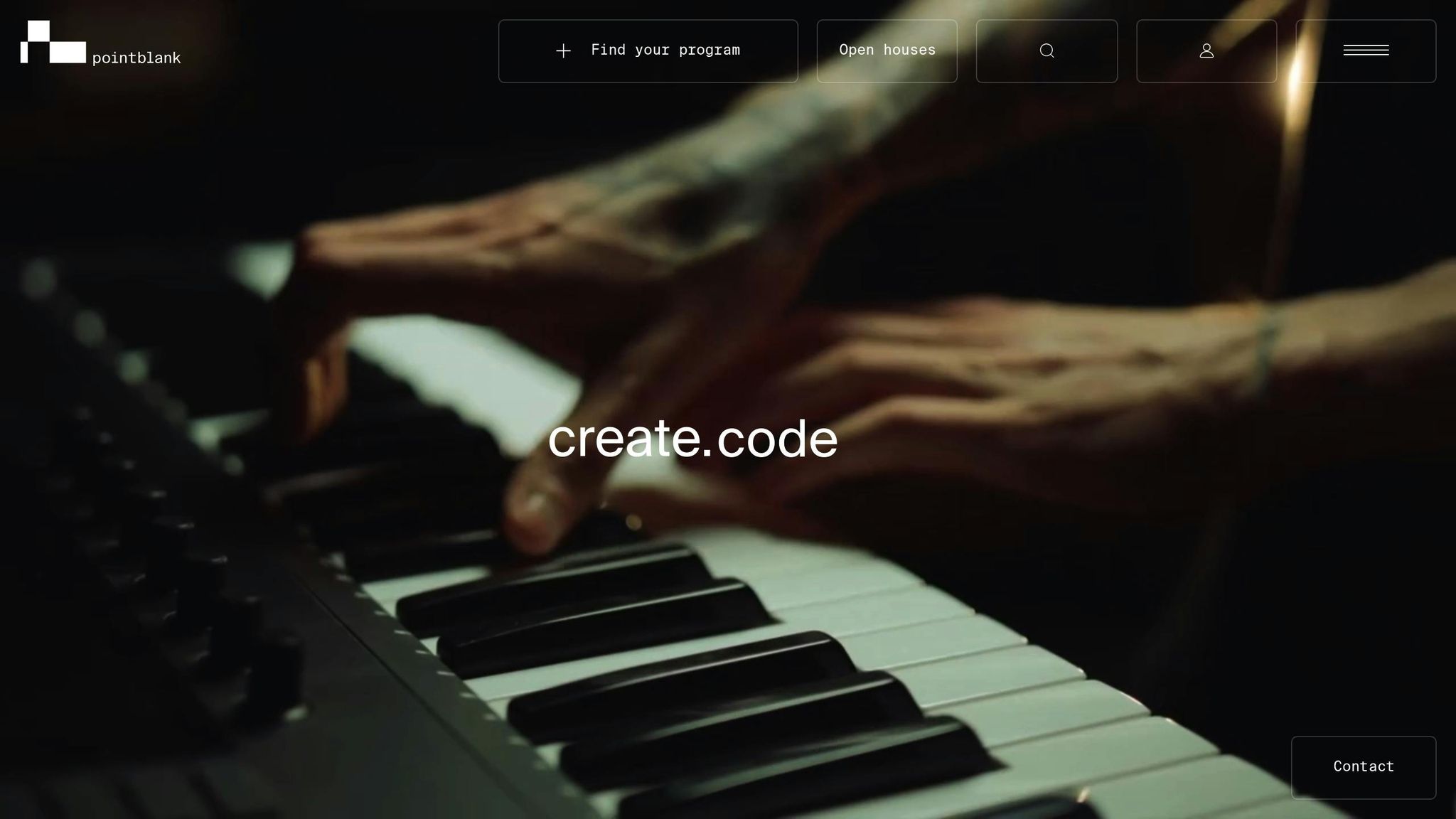Best Online Sound Engineering Courses in 2025
Explore the top online sound engineering courses in 2025, offering practical skills, flexible learning, and industry recognition for aspiring audio professionals.

-
Upskillist Sound Engineering Certification
- Focus: Practical skills in recording, mixing, and mastering
- Cost: $39.99/month with a free trial
- Accreditation: CPD-certified
-
Academy of Art University Sound Design Programs
- Focus: Comprehensive degree options (AA, BFA, MA, MFA) for multimedia sound design
- Cost: ~$35,569/year (undergrad); ~$29,731/year (grad)
- Accreditation: WSCUC
-
Berklee College of Music Online Programs
- Focus: Advanced audio production and music engineering
- Cost: $1,545 per 3-credit course; $61,800 for a full undergrad degree
- Accreditation: NECHE
-
American University Audio Technology Programs
- Focus: Technical and creative audio engineering
- Cost: $30,135/semester for full-time undergrad; $2,080 per grad credit hour
- Certifications: ProTools, Dante
-
Point Blank Music School Online Courses
- Focus: Music production and audio engineering with industry-standard tools
- Cost: $19,245 for a 1-year diploma; financial aid available
- Accreditation: Middlesex University
Quick Comparison Table:
| Program | Focus | Cost | Accreditation | Best For |
|---|---|---|---|---|
| Upskillist | Practical, job-ready skills | $39.99/month | CPD-certified | Beginners, career changers |
| Academy of Art | Multimedia sound design | ~$35,569/year | WSCUC | Film, TV, and game audio roles |
| Berklee Online | Advanced audio production | $1,545 per course | NECHE | Aspiring music producers |
| American University | Technical and creative engineering | $30,135/semester | ProTools, Dante | Engineering-focused careers |
| Point Blank | Music production with hands-on training | $19,245/year | Middlesex University | Music industry professionals |
These programs cater to diverse needs, from beginners to seasoned professionals. Choose based on your career goals, budget, and preferred learning format.
How to become an audio engineer in 2025 | iZotope

1. Upskillist Sound Engineering Certification

Upskillist's Professional Diploma in Sound Engineering is tailored to meet the growing demand for audio engineering expertise. With a platform hosting over 30 million students, this program is an appealing option for both newcomers and seasoned professionals aiming to sharpen their skills in the field.
The course is structured around four key areas:
Curriculum Depth
This program dives into the essentials of audio production, including sound recording, editing, mixing, and mastering. Instead of focusing heavily on theory, it emphasizes practical, hands-on experience with industry-standard tools and software. With 32 hours of self-paced content, the course equips students with the practical know-how required in today’s sound production environments.
Certification & Accreditation
The certification holds CPD (Continuing Professional Development) accreditation, which enhances its value in the job market. According to hiring trends, 43% of employers favor candidates with post-secondary vocational certificates, and 64% consider associate's degrees advantageous - though only 14% see any degree as absolutely mandatory. This credential aligns well with these preferences, making it a strong addition to a professional portfolio.
Cost & Accessibility
At $39.99 per month, the program offers a cost-effective learning solution. Prospective students can take advantage of a free trial to explore the course before committing. Its flexible, on-demand format allows learners to pause and resume their studies as needed, making it suitable for those with busy schedules. Additionally, Upskillist's TrustScore of 4.4 from 3,933 reviews highlights the high level of satisfaction among its users.
Industry Relevance
The certification is designed with industry trends in mind. The audio engineering field is expected to see 10% job growth from 2018 to 2028, adding approximately 12,100 new positions during that period. With an average salary of $55,853, this career path offers solid earning potential. Ian Corbett, an expert from Kansas City Kansas Community College, underscores the importance of ongoing education in the field:
"Audio professionals have to remain students for life to stay abreast of technological change and adapt to market demand – membership in the Audio Engineering Society is a particularly good avenue for continuing education."
2. Academy of Art University Sound Design Programs

Academy of Art University offers four fully accredited degree options: AA, BFA, MA, and MFA. These programs are recognized for their academic rigor and industry alignment.
Curriculum Overview
The sound design programs offer a clear progression from basic to advanced skills. The AA program introduces students to the fundamentals of digital audio, laying a solid groundwork for further study. Building on this, the BFA program dives deeper with advanced techniques, including editing, production, and sound design. Students also develop a professional demo reel as part of their portfolio, preparing them for industry opportunities.
Graduate programs cater to those aiming for expert-level proficiency. The MA program (36 units) focuses on high-level sound design and soundtrack creation for visual media. Meanwhile, the MFA program (63 units) emphasizes independent research and creative work, culminating in an original thesis project. Both graduate programs are designed to meet the demands of advanced practitioners, ensuring students are ready to tackle complex industry challenges.
Certification and Accreditation
Academy of Art University is institutionally accredited by the WASC Senior College and University Commission (WSCUC), covering both onsite and online programs. This accreditation was reaffirmed on June 25, 2021, and remains valid until the next review in 2028-2029.
Unlike short-term certificate programs, these degree pathways provide recognized academic credentials that employers value in the entertainment and media industries. Graduates are equipped to apply sound design skills in fields such as film, television, animation, gaming, and commercials.
Tuition and Payment Options
Tuition costs vary depending on the program and student status. For undergraduates, tuition ranges from $1,300 to $1,680 per unit, with a full-time domestic student paying approximately $31,224 annually for 24 units. Including additional expenses, the total estimated cost is $35,569 per year. Graduate students can expect tuition between $1,477 and $1,857 per unit, with annual costs around $26,586 for 18 units, totaling approximately $29,731 when factoring in other expenses.
To make education more accessible, the university offers installment payment plans and accepts international payments through Flywire. Dedicated Student Financial Specialists are available to help students explore funding options and create payment plans tailored to their needs.
Industry Alignment
The combination of a rigorous curriculum and flexible learning options ensures students are well-prepared for the demands of the entertainment industry. The BFA program, for instance, includes training for Pro Tools User Certification and Ableton Live Certification, directly aligning with professional standards.
Students can choose their entry point into the sound design field based on their career goals. The AA program prepares graduates for entry-level roles, while the BFA program equips students for more advanced positions. Those pursuing graduate degrees gain specialized expertise, positioning themselves for high-level roles in fields like film, television, animation, games, and commercials.
3. Berklee College of Music Online Programs

Berklee College of Music brings its world-class music education to a global audience through Berklee Online, which has served over 30,000 students across more than 140 countries. This platform provides top-tier sound engineering education, offering the same high-quality instruction as the Boston campus but at a cost that's about 64% lower than on-campus tuition[36,38].
Curriculum Overview
The program is structured across six levels, starting with essential software training in tools like Pro Tools, Ableton Live, Logic, and Cubase. As students progress, they delve into advanced topics such as mixing, mastering, and system design. Classes are intentionally small, capped at 20 students, and are available in flexible formats of either 4-week or 12-week durations[36,37,38].
This comprehensive curriculum ensures students gain the skills needed to earn respected, industry-recognized credentials.
Certification & Accreditation
Berklee Online holds accreditation from the New England Commission of Higher Education (NECHE). Students can choose from several credential options, including individual courses, Professional Certificates (3–5 courses), and Advanced Professional Certificates (8–12 courses). These programs are designed to equip students with the qualifications and practical skills needed for success in the music and audio industries. All courses are taught by the same esteemed faculty who teach at the Boston campus[38,39].
These credentials come with competitive pricing and flexible financial solutions to accommodate a variety of students.
Cost and Financial Options
The cost for individual courses is $1,545 for 3 credits. Certificate and degree programs are also competitively priced, with undergraduate programs costing $61,800 for 120 credits and graduate degrees priced at $33,120 for 36 credits. To make these programs more accessible, Berklee Online offers flexible payment plans, along with discounts such as a 10% reduction for upfront payments[40,41].
Preparing for the Industry
Berklee Online’s curriculum is designed to meet the evolving demands of the audio production industry. Courses like audio ear training and acoustics provide a strong technical foundation, while specialized programs such as Audio Post Production for Film and TV and Audio/Music Production for Visual Media address the growing needs of the entertainment sector. Graduates are well-equipped for various careers, including work in recording studios, live sound, post-production, and media companies. Additionally, the program's global student base and faculty with industry connections create invaluable networking opportunities, linking students to professionals worldwide[36,37].
4. American University Audio Technology Programs

American University's Audio Technology Program blends technical expertise with creative artistry, drawing from fields like computer science, physics, and the performing arts. This interdisciplinary approach equips students with a broad understanding of sound engineering, making it a standout choice for aspiring audio professionals.
The program offers several degree options to suit different career paths and skill levels, including a BA in Audio Production, BS and MA in Audio Technology, and a graduate certificate in audio production.
Curriculum Overview
The curriculum is designed to take students from the basics of audio technology to advanced techniques. It starts with ATEC-101 Fundamentals of Audio Technology, which introduces sound generation and recording, followed by ATEC-201 Digital Signal Theory, where students work with MATLAB and learn audio editing.
Students then dive into digital audio workstations in ATEC-225, focusing on non-linear editing and MIDI recording, and progress to advanced systems and automation techniques in ATEC-325. Courses like ATEC-415 and ATEC-416 cover multi-track recording and professional microphone techniques, preparing students for real-world applications.
Advanced topics include ATEC-405 Acoustics, where students explore the physics of sound waves, and ATEC-407 Sound Synthesis, which focuses on digital sound creation using programming. Other key courses, such as ATEC-425 Production Mixing and ATEC-452 Critical Listening, sharpen skills in mixing and aural analysis. The program culminates in the ATEC-450 Audio Technology Capstone, where students undertake ambitious projects like music recording or acoustic simulation.
For graduate students, courses like ATEC-617 Masterclass in Recording and Production and ATEC-651 Digital Audio Analysis provide advanced training. The MA program requires 30 credit hours, while the BS program involves 45 credit hours.
Certifications and Alumni Success
The program offers certifications in ProTools and Dante, two highly respected credentials in the audio industry. Alumni testimonials highlight the program's value:
"The different classes I was able to take gave me a great foundation for my current audio skill set. I still use a lot of what I learned in school on a regular basis."
- David Greenburg (CAS '22), now an audio engineer at NPR.
Jonathan Cornell (MA '23), Head of Music at Immersive Audio Album, shares how the program prepared him for professional interactions:
"Learning proper mixing workflow in class was so critical, as it helps me interface with these professionals in the industry... Once they hear me asking about concepts like mix bus compression, stems, or send/return channels, they know I'm speaking their language.".
Costs and Accessibility
For the 2025-2026 academic year, tuition costs are as follows:
- Graduate students: $2,080 per credit hour
- Undergraduate part-time students: $2,007 per credit hour
- Full-time undergraduates (12–17.5 credit hours): $30,135 per semester.
Graduate students also pay additional fees, including a $50 Graduate Activity Fee, $450 Support Services Fee, and $136 Metro U-Pass. Housing costs range from $4,430 for triple occupancy to $9,595 for apartments at Frequency. Tuition insurance is available through a partnership with GradGuard™.
Career Opportunities in the DC Area
The program's location in Washington, DC, offers a significant advantage. The DC area ranks 5th nationally for sound engineer salaries and 4th for job availability, with twice the national average concentration of audio technician and engineering roles. The Bureau of Labor Statistics predicts a 21% job growth rate for broadcast, sound, and video technicians from 2020 to 2030.
Students gain hands-on experience through internships at organizations like NPR, BBC, Discovery Communications, and SiriusXM. Graduates have gone on to work at companies such as Bose Corporation, NASA, Spotify, and Vice.
Daniel Carasol (2019), now a House Engineer at Quad Studios, shares this advice:
"Collaborate with one another and be bold in [your] approach to the music creation process... Be willing to share knowledge, open to collaboration, and brave when experimenting within audio.".
5. Point Blank Music School Online Courses

Point Blank Music School, founded in 1994, has spent over three decades shaping the future of sound engineering education. With a global reach that has connected with more than 50,000 students, its online programs are designed to deliver hands-on learning in music production, audio engineering, composition, and sound design. The flagship offering, the Music Production & Audio Engineering Diploma, is packed with practical and theoretical knowledge to prepare students for the music industry.
Curriculum Depth
This program spans four terms and includes 14 modules, offering a structured learning path that starts with the basics of music production and progresses to advanced techniques in composition, mixing, and mastering. Students work with industry-standard software like Ableton Live and Logic Pro X, ensuring they gain practical skills from day one. The course is available in two formats: a 12-month standard track or a more intensive 9-month option. In addition to technical training, students earn certifications that are recognized across the music industry.
Certification & Accreditation
Point Blank partners with Middlesex University, which ensures its higher education programs meet rigorous academic standards. Graduates not only gain practical expertise but also receive a Middlesex University award, adding academic weight to their credentials. The school offers a variety of certification options, such as the Music Production Certificate and the Music Production & Composition Award. Its reputation for quality is reflected in accolades like the "Best Independent HE" award from the What Uni Student Choice Awards.
Cost & Accessibility
The program's pricing varies depending on the certification pursued. The Music Production Certificate costs $2,745 when paid upfront, while the Production & Composition Award is priced at $4,895. The one-year diploma program is $19,245. To make these courses more accessible, Point Blank offers several financial aid options, including the Music Industry Leaders Scholarship and need-based grants that can reduce tuition by up to 20%. Flexible installment plans are also available to help ease the financial burden.
Industry Relevance
Point Blank ensures its programs stay aligned with the latest industry standards, blending academic rigor with practical mentorship from seasoned professionals. Students work with cutting-edge tools like Native Instruments Komplete and Waves plugins, mirroring the software used in professional studios. The school’s global presence, with campuses in London, Los Angeles, Ibiza, Mumbai, and an online platform, exposes students to diverse music industry practices and regional trends, giving them a well-rounded perspective. This focus on real-world application and modern tools prepares graduates to meet the demands of a rapidly evolving industry.
Program Comparison: Pros and Cons
Let's dive into a side-by-side look at the key features of each program to help you weigh their strengths and limitations. Whether you're prioritizing curriculum, cost, or career support, there's something here for everyone.
Curriculum Depth and Specialization varies widely across these programs. Upskillist's Sound Engineering Certification zeroes in on practical, job-ready skills through hands-on projects, focusing on modern production techniques and industry standards. Berklee College of Music Online Programs, on the other hand, balance theoretical knowledge with practical training, offering specialized tracks in music production and engineering to keep pace with the field's evolution. Point Blank Music School leans heavily into software-focused training, emphasizing tools like Ableton Live and Logic Pro X. Meanwhile, Academy of Art University's Sound Design Programs cater to multimedia needs, covering film, television, and game audio production. Lastly, American University's Audio Technology Programs combine technical engineering principles with creative applications, offering a unique blend of skills.
Cost Structure and Value Proposition is another critical factor. Berklee Online stands out for its competitive tuition, with certificate programs requiring a $175 registration fee and courses costing $1,545 per credit - about 64% less than their on-campus equivalent. In contrast, American University's Audio Technology Programs come with a hefty price tag of $57,952 per year. Point Blank Music School offers more flexible pricing at £6,000 annually or £2,000 per term. Beyond tuition, the long-term value of the credentials and career opportunities they unlock is worth considering.
Certification and Industry Recognition can be game-changers. Many of these programs offer certifications tied to specific software, like the Pro Tools Certified User credential, which demonstrates expertise in industry-standard tools and boosts your credibility with employers.
Industry Connections and Career Support play a crucial role in bridging education with professional opportunities. Programs offering internships, partnerships with local studios, or networking events provide valuable pathways into the audio industry. With the American Bureau of Labor Statistics forecasting a 21% growth in production-related fields, including audio engineering, between 2020 and 2030, such support can give you a competitive edge.
Learning Format and Flexibility is another major consideration. Online courses cater to working professionals by offering convenience, while some programs include hands-on studio sessions in professional-grade facilities for those who prefer a tactile learning approach.
Finally, median wages in related fields highlight the importance of aligning your program choice with your career ambitions. Here's a quick comparison table to help you narrow down your options:
| Program | Pros | Cons | Best For |
|---|---|---|---|
| Upskillist | Focuses on practical, industry-relevant skills; flexible learning options | Limited traditional academic credentials | Career changers, working professionals |
| Berklee Online | Strong reputation; comprehensive curriculum; cost-effective compared to on-campus programs | Higher overall cost; longer time commitment | Aspiring music production professionals |
| Point Blank Music School | Software-focused training; flexible payment plans | Premium pricing | International students |
| Academy of Art University | Specializes in multimedia applications like film and game audio | Narrower focus | Film and game audio specialists |
| American University | Strong technical foundation; engineering-oriented curriculum | Highest annual cost | Technical audio engineering roles |
This breakdown highlights the trade-offs and strengths of each program, helping you align your choice with your goals and budget.
Conclusion
Choosing the right sound engineering program largely depends on where you are in your career and what you aim to achieve. Each program caters to different needs, so understanding your priorities is key.
If you're just starting out, programs like Upskillist and Berklee Online offer great options. Upskillist's Sound Engineering Certification is ideal for beginners, thanks to its practical, flexible approach that focuses on job-ready skills without overwhelming you with theory. On the other hand, Berklee Online provides a more traditional academic experience, with foundational courses priced at $1,545 per 3-credit course (or $1,345 with early enrollment). Keep in mind that Berklee’s certificate programs also include a one-time $175 registration fee. Both programs are designed to meet the needs of those entering the field, but they do so in different ways.
For working professionals, flexibility and skill advancement without income disruption are often top priorities. Industry expert Darryn De La Soul emphasizes the importance of adaptability in live sound engineering:
"The subject of live sound is, by its nature, neither particularly academic nor set in stone. Every situation is different and the skills that are really required to be successful are adaptability, and the means to make the best of a bad job and still put on a show with half a microphone and three bits of gaffer tape."
Programs like Point Blank cater to professionals by offering software-focused training and the flexibility to balance learning with a busy schedule. These programs also provide networking opportunities and access to cutting-edge equipment, which can be invaluable for career growth.
For those switching careers, fast-track programs with real-world training stand out. As Jim from DBS Music explains:
"One thing that we are trying is the idea of accelerated, fast-track courses, which mean students save time and money and get out into the marketplace sooner. We also have outside 'real-world' gig experiences for our students, because understanding how the classroom theory relates to the hard graft and tough time schedules of commercial shows is an essential component of the learning process."
These programs are perfect for career switchers, offering hands-on training, guest lectures from industry professionals, and opportunities to gain practical experience through live gigs.
Ultimately, the best program for you depends on your timeline, budget, and career goals. If entering the workforce quickly is your priority, focus on hands-on programs with strong industry connections. For those seeking a deeper, more academic foundation, options like Berklee or American University may be a better fit.
Before committing, take advantage of free trials or previews to see if the program’s format aligns with your learning style. Your success in sound engineering will come down to how well the program matches your aspirations and how effectively you apply what you learn.
FAQs
What should I look for in an online sound engineering course?
When selecting an online sound engineering course, it’s important to focus on a few essentials to ensure it aligns with your goals. Start by reviewing the curriculum - does it dive into key areas like audio theory, mixing, mastering, and industry-standard tools like Pro Tools or Logic Pro? A solid foundation in these topics is non-negotiable. Also, prioritize courses that offer hands-on experience, whether through practical training sessions or access to professional-grade tools. Real-world practice can make all the difference.
Another factor to weigh is flexibility. If you’re juggling a busy schedule, look for part-time or self-paced options that let you learn at your own rhythm. Finally, check if the course provides recognized certifications and is led by experienced professionals. These elements not only enhance your skills but also strengthen your career prospects in the competitive world of audio engineering.
Why are accreditation and certification important for advancing a career in sound engineering?
The Role of Accreditation and Certification in Sound Engineering
Earning accreditation or certification can be a game-changer for your career in sound engineering. These credentials highlight your expertise, technical skills, and commitment to meeting industry standards - qualities that employers actively seek.
Certified professionals tend to stand out during the hiring process, often unlocking better job opportunities and even higher pay. Plus, certifications from respected organizations signal that you're staying up-to-date in a fast-changing field, giving you a solid advantage in a competitive job market.
What financial aid options are available for online sound engineering courses, and how can they help reduce costs?
In 2025, students enrolled in online sound engineering courses can tap into a variety of financial aid options to help with tuition costs. Many schools provide access to federal student aid, including grants, loans, and scholarships designed specifically for those studying audio engineering. For veterans, programs like the GI Bill® offer additional support, making education more affordable.
Scholarships are also a valuable resource for cutting down expenses. Numerous organizations and institutions offer awards tailored to sound engineering students. By exploring these opportunities and ensuring they meet the eligibility criteria, students can reduce their financial burden and focus on honing their expertise in the field of sound engineering.

